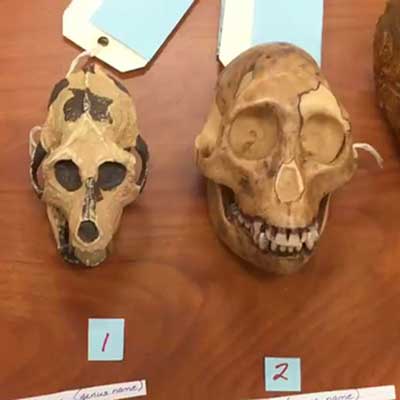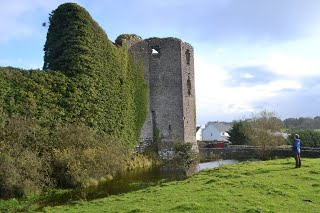
In The Field
Ireland Program this summerNot Part of Foothill CollegeBeing run independently with our colleagues from USA and Ireland
|
About the Program
DATES: Running this summer in Ireland, NOT THROUGH FOOTHILL COLLEGE THIS YEAR, but here is some information
LOCATION: Country Roscommon, Ireland
Interested? Fill out PRELIM APPLICATION LINK
PROJECT WEBSITE: Castles in Communities
PROJECT VIDEO: A Castle in our Community
-
Join us in medieval Ireland and the kingdom of Connacht where the last high kings defended their country against invading English nobles.
-
Experience an amazing archaeology and cultural program with anthropological field work, course work, group trips, service learning projects, and a living history experience.
-
Discover with us the beauty of Ireland as we begin an investigation of the landscapes surrounding the medieval castle of Ballintober in County Roscommon.
-
Live with us and other project members in both the manorial estate and the adjoining villages.
-
Work on all aspects of the research project, including archaeological survey and excavation and community development activities.
The Castles in Communities program, is an intensive, 4 week non-credit combined archaeological/anthropological field school and cultural immersion experience in the “hidden heartland” of Ireland. The program weaves together, on a day-to-day basis, lectures, discussions, readings, fieldwork activities, excursions and hands-on practice & service learning in the fields of archaeology, cultural anthropology and applied anthropology. The program also integrates opportunities for immersion into the communities and natural surroundings.
This year it is not being run through Foothill College. Your application will go to our Irish co-director, Dr. Niall Brady, who will be contacting you and arranging the field season.
Current Project Directors
Dr. Niall Brady (Archaeological Diving Co. Ltd.)
Rachel Brody MA (Boston College)
Andrew Bair MA (Harvard University)
Past Project Directors & Faculty (past and present)
Siobhan Boyd, MS (Gardiner Museum)
Daniel Cearley, MA (Las Positas College)
Dr. Samuel V. Connell (Foothill College)
Dr. Chad Gifford (Columbia University)
Dr. Kathryn Maurer (Foothill College)
Ana Gonzalez, MA (Foothill , Cabrillo, Mission, and Evergreen Colleges)
The Field Experience for Program Participants
Your field experience will consist of a holistic and multidisciplinary examination of castles in communities from the past to the present. Castles are enduring monuments in the countryside that have complex relationships with people continuing to the present. Our student-focused archaeological and anthropological project investigates simultaneously the ancient and modern medieval Irish landscape.
As a participant on this project, you will learn cutting edge archaeological field techniques. You will have an opportunity to excavate earlier castle construction within the castle walls, and engage in systematic foot survey and geophysical techniques such as ground-penetrating radar within and around the castle, including within a deserted settlement – likely a medieval village! – discovered by Castles in Communities students a few years ago!
Castles in Communities students also learn about the nature and importance of community-engaged archaeology. You will learn about and utilize ethnographic fieldwork methods as part of Castles in Communities’ systematic study of the local community’s relationship with the castle and their medieval heritage through time. As part of your anthropological field experience, you will also have a rewarding opportunity to participate in community-sponsored events, such as Irish dancing and storytelling, and become involved in community service projects.
Your daily field experiences will be complemented by cultural immersion experiences and field trips to a multitude of archaeological and ethnographic sites in a beautiful and archaeologically exciting region of “undiscovered” Ireland, known as the “Hidden Heartland.” You will be living in the communities of Ballintober and Castlerea, and two hours by train from Galway or Dublin on the weekends. The world famous beaches of Sligo are less than an hour to the north, along with incredible lakes in the region. For the adventurous, England and the rest of Europe are not far away. Ireland is a truly remarkable place, and we are excited to share its wonders with you, and meanwhile to do some really interesting archaeology!
You can read more about the focus of our research on the Castles in Communities website.
The Academic Coursework will not be offered this summer. It is a non-credit experience run by Dr. Niall Brady in Ireland.
If you are interested in a for-credit field program, please see the Hawaii program running in August or other programs. The following is a description of the 2022 courses, this summer you still get these experiences, you just don't get credits. We will award a certificate of field school completion but no credits. The following is in red so you recognize it is not happening this summer[[[All program participants enroll in Foothill College for the summer quarter. New students (first time on a Foothill field school) enroll in 12-13 units of coursework. Returning students and volunteer staff enroll in no less than 4 units. Some exceptions to minimum enrollment requirements will be considered on a case-by-case basis.
Courses may include some or all of the following (final summer class schedules will be available sometime in April).
ANTH 12: Applied Anthropology (4 units)
ANTH 52: Archaeological Field Methods (4 units)
ANTH 17L: Archaeology Laboratory (2 units)
ANTH 51: Archaeological Survey (2 units)
ANTH 67C: Cultures of the World: British Isles (4 units)
ANTH 70-73R Independent Study In Anthropology (1-4 units)
The course objectives and your learning opportunities for each of the courses you enroll in are woven together day-to-day, often in an integrated and holistic fashion. The primary objectives for the academic component of our program includes the following: ]]]
The program will do several things:
- Prepare students to operate in a field archaeology environment anywhere in the world by exposing them to methods of site reconnaissance, surveying, excavation techniques, data recording, photography and drawing, and artifact analysis (ceramic typology and stone tool production experiments) in a laboratory environment;
- Demonstrate to students how we interpret the past from what we find in the present by laying the groundwork for understanding the links between method and theory in archaeology;
- Expose students to the Medieval period of Ireland, specifically the period of Anglo-Norman incursion and local Irish resistance, thus contributing greatly to their understanding of imperial and colonial processes in the ancient and modern worlds.
- Raise students’ awareness of the implications, politics and economic impact of archaeological research, discovery, analysis and interpretation on modern communities adjacent to archaeological sites.
- Introduce students to the skills necessary to conduct basic ethnographic/anthropological fieldwork techniques including observation, participant observation, mapping, interviewing, photography & video, and written documentation, and ensure ethical practice of anthropological fieldwork;
- Introduce students to how and why cultural anthropologists use ethnographic fieldwork methods to analyze and write about local communities and cultural heritage; and how these methods and analyses can be applied to assess community needs and support community and economic development;
- Ensure students become familiar with the different languages, cultures and people of Ireland;
- Help students learn and successfully implement skills of cultural exploration, immersion and adaptation.
Again - the below in red is not required but will be accepted by current directors.
We are especially excited to offer students of all levels of experience the opportunity to carry out a Student Independent Pilot Project (SIPP). These projects are developed by the students during the field program and the investigation and analysis takes place in the field under careful supervision. A short final paper (5 pages) is due at the end of the summer quarter. SIPPs initiated on our program have turned into conference papers, Senior/honors theses, and even investigations students have continued on at the graduate level. It’s an experience unparalleled on other field schools.
Food and Lodging
All students, staff and directors live in the village of Ballintober (where the castle and deserted medieval village is found) and/or at Clonalis Manor in the adjacent town of Castlerea throughout our stay. In Ballintober and at Clonalis, students and staff live together in large, furnished homes with shared bedrooms and baths. Upon request, and at an additional cost, we may be able to accommodate requests for single rooms.
We eat delicious and filling catered meals, which include vegetarian and vegan options, each field day. These group meals are prepared by local cooks, and served to us in the local pubs. Homes are also stocked with groceries for self-catering of breakfasts and lunches, and weekend dinners. All dietary needs are accommodated.
The area of study is located in the County of Roscommon which is centrally located in the west of Ireland near to Sligo and Galway. The bigger nearby towns of Castlerea and Roscommon are on train lines and bus lines which can be used on free days to explore. As you will discover, the area is a wonderful place to spend a month -- small, open and enjoyable.
Program & Course Fees:
Program FeesPlease see program webpage for details.
The program fees include food and lodging, as described above, all program activities, and program travel in country (including group transport to/from Dublin on the program start and end dates). The fees do not include international travel to/from Ireland, or individual accommodation or travel within Ireland outside of the program activities or dates. Program fees are due in full by June 15, 2023 to ADCO.
Who can apply?
Anyone who will be 18 or over on June 29th, 2023 is welcome to apply! No prior experience in anthropology, archaeology or international travel is required to join our programs. We welcome and thrive on adult participants of all ages and levels of experience, from total beginners all the way through graduate students and visiting scholars.
Application Review:
We evaluate new and returning student qualifications based on a combination of criteria including:
- Good academic standing in your current or prior program of study;
- An interest in anthropology and archaeology (no prior coursework required);
- An appreciation for the value of a study abroad and field experience.
- An excitement about your commitment to join the Castles in Communities Program.
We will contact you if any follow-up information is needed, and we will notify you by email as soon as the status of your application is determined, generally within a week or two of receipt of your completed application.
For more information
We encourage you to come to one of our Information Sessions (see above for dates/times), if you are in the area.
All Information Sessions will be held on zoom and announced to all people who email. When on campus, they are held in room 3101, see map for room location, directions and parking information.
For more information, please contact:
Dr. Samuel Connell
Foothill College Anthropology Department
12345 El Monte Rd.
Los Altos Hills, CA 94022
USA
Email: connellsamuel@foothill.edu
Phone: (650) 949-7197
Links and Projects on Medieval Ireland
- www.archaeology.ie - National Monuments Service official website for Irish archaeology
- http://www.emap.ie/ Early Medieval Archaeology Project. A long-term project with great information gathered on the period.
- http://www.discoveryprogramme.ie/ the Discovery Program
- Center for Medieval and Renaissance Studies
Q. Who Can Apply?
Anyone with a high school diploma who will be older than 18 on the trip.
Q. Do I need to be an archaeologist?
Certainly not.
Q. Will there be financial aid?
We are working on this through the Foothill Foundation and Financial Aid at Foothill.
ALL OTHER QUESTIONS CAN BE ANSWERED VIA THE PROJECT WEBSITE:
https://sites.google.com/view/irelandcastlesincommunities

Questions?
We're Here to Help!
Anthropology Department
Sam: 650.949.7197
Kathryn: 650.949.7751
Julie: 650.949.7430
Samuel Connell
Kathryn Maurer
Julie Jenkins
Office 3017, Main Campus
Ireland Program |
More Information |


